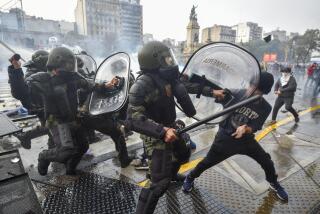Argentina’s Senate votes against hike in farm tariffs
BUENOS AIRES — The farm crisis that has divided the agricultural powerhouse of Argentina for months took a dramatic turn Thursday, when the Senate voted against the government’s incendiary new tax on grain exports.
The decisive vote was cast by the government’s own vice president after an 18-hour Senate debate, stunning observers and igniting a political crisis.
The higher grain levies have been in effect via presidential edict, despite questions about their constitutionality. The failed congressional initiative, legal scholars said, would have inoculated the taxes from court challenges and left farmers with little choice but to comply. Instead, the divisive debate will continue.
“This must be the most difficult day of my life,” the visibly exhausted vice president, Julio Cobos, declared before casting the crucial ballot about 4:30 a.m. against the bill championed by his boss, President Cristina Fernandez de Kirchner. “Let history judge me.”
His vote broke a 36-36 deadlock and dealt a humiliating defeat to Kirchner and her husband, ex-President Nestor Kirchner, who have been at virtual war with the prosperous agricultural sector since March. That’s when the president, a self-styled champion of the working class and the left, decreed a new sliding-scale hike in export duties on soybeans and other grains.
The tax was designed to generate more revenue for social projects in Argentina, the government says, from the global bonanza in grain exports, especially sales of soy to Asia and Europe. Argentina, with its vast Pampas, is a leading producer of soy, corn, wheat and beef, and the nation has benefited from soaring global food prices. The government said the tax was also meant to encourage the planting of wheat and corn, staples here, instead of export crops such as soy.
But farmers balked and staged a series of strikes, blocking roads and refusing to ship their crops. Many middle-class urban Argentines sided with their revolt in what has become a kind of civil uprising against the Kirchners and their perceived autocratic ways. Homemakers banged pots and pans in city streets in noisy solidarity with the farmers.
Criticism of the first couple has mounted amid rising prices that have eroded the Kirchners’ principal political capital -- their role in guiding the country to robust growth after the 2001-02 economic collapse. The Kirchners say reports of runaway inflation of 20% or more are exaggerated, though many consumers disagree.
The Kirchners have condemned the farmers as greedy “oligarchs” and likened them to 1970s coup plotters. Agricultural groups say they represent many small farmers squeezed by taxes.
This last week, both government backers and farming groups mounted mass rallies that flooded the streets with several hundred thousand protesters, shutting down much of this capital.
Despite dominating political life here, the months-long tax standoff has unfolded with much vitriol but little violence.
Some observers promptly labeled Thursday’s congressional rebuke the historic end of the virtual monopoly on power that the Kirchners have held since 2003, when Nestor Kirchner was first elected. He stepped aside last year, allowing his wife, then a senator, to run and win a four-year term. He now heads the ruling party, and some say he wields as much power as ever.
“Kirchner-ism, as it has been practiced, ended in the surprising early morning of today,” wrote Joaquin Morales Sola in the conservative daily La Nacion, often critical of the presidential couple. “The Argentine presidential matrimony doesn’t know another way of governing other than imposing their own will on politics and society.”
The vice president’s dramatic vote was looped over and over on TV news. Allies of the farmers hailed Cobos as a patriot, while pro-government forces called him a turncoat.
“This was treason,” said Hugo Alvarez, 54, one of many pro-Kirchner activists who had kept vigil outside Congress.
Cobos is part of the Kirchner administration, but he is not a member of the Peronist party apparatus that the Kirchners now lead. A former stalwart of the Radical Party, a traditional rival of the Peronists, Cobos is among many opposition politicians who were drawn into the governing coalition. The resulting alliance has allowed the Kirchners to dominate Congress and state legislatures.
Until Thursday’s vote, many skeptics dismissed Congress as a rubber stamp for the Kirchners’ agenda; the lower house had already approved the tax. However, even many Peronist senators ultimately broke with the Kirchners on the farm tax issue, highlighting the broad sweep of opposition.
What the Kirchners will do next remains the big question. The farmers have called for renewed negotiation. The president could propose a compromise grain-tax bill or some alternate measure.
--
patrick.mcdonnell @latimes.com
Andres D’Alessandro of The Times’ Buenos Aires Bureau contributed to this report.
More to Read
Sign up for Essential California
The most important California stories and recommendations in your inbox every morning.
You may occasionally receive promotional content from the Los Angeles Times.










